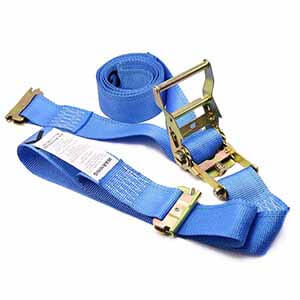Top Tips to Prevent Theft in the Transportation Industry
Cargo security is an important aspect of the transportation industry, truckers and transportation companies play a vital role in ensuring that shipment reach their destination safely. However, the industry faces significant challenges when it comes to theft and security breaches.
Cargo theft is a widespread problem. According to the latest reports, cargo theft in the United States in 2023 will be worth at least US$130 million, an increase of 57% over the previous year. This is a very alarming number. The impact of theft goes beyond financial losses, with truckers and transportation companies facing increased insurance premiums, delayed deliveries, and damaged customer relationships. Stolen goods may also flow into the black market, causing potential harm to consumers who purchase them. Today, let’s explore top tips to prevent theft in the transportation industry and build a more secure future for cargo transportation.

Types of Theft in the Transportation Industry
The transportation industry faces various forms of theft, and understanding these thefts can help develop security measures accordingly.
Cargo Theft
During truck and trailer transport or while parked midway, instances of cargo theft often occur. This may involve partial theft of goods, or the entire load being stolen.
Fuel Theft
When trucks stop for rest breaks or refueling at gas stations during transit, incidents of fuel theft commonly occur. Fuel theft not only results in economic losses but also leads to delays in the timely delivery of goods.
Identity Theft
Some goods require identity verification to access their information. Criminals may steal the identity of legitimate drivers or transport companies to gain access to the cargo information.
Freight Interception
Criminals may intercept shipments at rest areas or traffic stops, posing as law enforcement or delivery personnel.
6 Tips to Prevent Theft in the Transportation Industry
We will discuss how to prevent property theft during transportation from 7 aspects and give specific solutions.
Tip 1: Secure Parking Practices
Choosing a safe parking location is a fundamental step for truckers and transportation companies to prevent goods from being stolen. Choose an area with a lot of traffic, police patrols, and surveillance cameras to reduce the risk of becoming targets for criminals. Here are some tips for evaluating the safe parking areas:
Well-Lit Environments
Whether it’s day or night, you should always choose well-lit areas for parking. Thieves are more likely to target dimly lit and secluded spots for theft, rather than well-lit environments.
Security Surveillance
Choose parking areas equipped with security cameras and monitoring systems. Surveillance footage can help identify potential suspects or provide evidence of theft after the incident.
Fenced and Gated Facilities
Park trucks in fenced areas that have secure access control, if people need to enter this area, they need an authorized identity, so thieves can not easily enter these areas.
On-Site Security Personnel
Parking the truck at some locations with on-site security guards, such as beside the community gate pavilion, next to the company’s security guard, near the university campus, etc.
Proximity to Highways
Parking the truck close to major highways or well-traveled routes. Thieves are less likely to steal in high-traffic areas because it’s so easy to get arrested.
Online Reviews and Recommendations
You can search related information online, the experienced truckers will provide valuable information to you for the safe parking area.
![]()
Tip 2: Implementing Tracking Systems
Equip your cargo and trucks with a GPS tracking system. Real-time monitoring of cargo and vehicle conditions can effectively reduce the risk of cargo theft for truck drivers and transportation companies.
Benefits of GPS Tracking Systems
Real-Time Visibility: GPS can provide real-time location data so that truckers and transportation companies can monitor the cargo location anytime.
Route Optimization: Tracking systems can help to plan the driving route, and avoid the high-risk areas.
Improved Fleet Management: Transportation company management can optimize operations by tracking vehicle movement and ensuring timely delivery.
Theft Recovery: If the goods have been stolen, GPS tracking can assist law enforcement in locating stolen cargo vehicles and recovering losses.
Geofencing Capabilities: GPS tracking can set the specific driving routes, once the vehicle deviates from the set route, an alarm will be triggered.
Historical Data Analysis: The tracking system stores historical data, it helps you analyze the best modes and optimal routes in fleet transportation management.
Various Tracking Technologies for Your Choice
Cellular-Based Tracking: This tracking system uses cellular networks to transmit location data. It is suitable for the area that has a wide range of network cover.
Satellite-Based Tracking: Satellite tracking systems use satellite communication to transmit location information, this method can compensate for those remote rural areas where cellular networks cannot reach.
RFID (Radio Frequency Identification): RFID technology uses radio waves to track and identify tagged items. Always work with GPS together to improve cargo security.
IoT (Internet of Things) Tracking: IoT devices can be integrated into the supply chain to provide real-time data on cargo conditions, temperature, humidity, and more.
Hybrid Systems: These are some tracking solutions that combine multiple technologies. This needs to be determined on a case-by-case basis to ensure optimal location tracking coverage.

Tip 3: Strengthening Perimeter Security
Besides finding a safe parking spot, installing tracking systems, and strengthening the safety devices on the truck are also very important.
The Way to Strengthen Truck’s Physical Security
Here are some ideas to strengthen your truck’s security from the physical aspect.
High-Quality Locks
Install the tamper-resistant locks on cargo doors and cab entryways. It is better to use hardened steel padlocks with anti-pick features.
Kingpin Locks
Using kingpin locks can prevent hitching the trailer to another tractor under unauthorized conditions.
Security Seals
Use high-quality, ISO-compliant security seals on trailers to detect tampering or unauthorized entry. Record the seal number to clarify responsibilities during transportation.
GPS-Enabled Locks
Looking for a lock manufacturer who has the ability to built-in GPS positioning function. This way, it can trigger an alarm when your lock is tampered with, and inform the real-time position.
Reinforced Barriers
Install steel gratings or metal cages on your goods to make it more difficult for thieves to steal your goods if they get close.
Regular Vehicle Inspection During Stops
Regular inspection is also necessary to ensure the safety of trucks and cargo, We need to pay attention to every detail to ensure the safety of transportation work.
Pre-Trip Inspection
Before each journey, drivers should check all locks, seals, and barriers for signs of tampering or damage.
Scheduled Checks
If your cargo transportation is a long-distance journey, you will need multiple stops along the way, you need to inspect the vehicle’s condition before each departure.
Report Suspicious Activity
If you notice suspicious individuals around your vehicle during your parking period, please report immediately.
Training and Awareness
The transportation company should provide drivers with training on how to identify potential security risks and maintain vigilance continuously.

Tip 4: Background Checks and Training
Back-checking employees and training employees on cargo and safety protocols will greatly improve the company’s property security and the safety of cargo transportation.
The Importance of Screening and Background Checks on Employees
Protecting Company Assets: Background checks on employees are necessary to protect company assets and help you identify and avoid those with criminal intent.
Minimizing Internal Threats: Theft does not only occur during transportation but also sometimes occurs within the company. Background checks can help you reduce the risk of hiring people with bad character or criminal histories.
Building Trust with Clients: When you promote your company to customers, you can show them the requirements for hiring employees to let them know that their goods are in the hands of a very responsible company and a reliable driver.
Complying with Industry Regulations: Industry regulations vary from country to country, and some countries or regions require transportation companies to conduct background checks on employees they hire.
Value of Training Employees on Cargo Security Protocols
Companies need to provide resources to train employees on cargo security awareness. These can be online courses, in-company training, industry conferences, or hiring experienced security consultants.
Creating a Security-Conscious Culture
Cargo safety training for employees can cultivate their safety awareness and make each of your employees an active participant in ensuring freight safety.
Identifying Potential Risks
Train employees to identify suspicious behavior and potential security risks so that they can take appropriate measures and report them promptly.
Effective Handling of Emergencies
Training equips employees with the knowledge and skills to respond appropriately in the event of a security breach or theft, minimizing losses.
Implementing Best Practices
By comprehensively training employees, transportation companies can establish standardized procedures, thereby improving operational efficiency.

Tip 5: Collaborating with Law Enforcement and Other Companies
The joint work of multiple departments and agencies will also bring many benefits to the company’s transportation work.
Benefits of Cooperating with Law Enforcement Agencies
Timely Response to Incidents: Working with law enforcement to establish a direct line of communication will allow for a rapid response when a theft occurs.
Access to Resources: When a theft has occurred, law enforcement agencies have direct access to surveillance and data, this is helpful for cargo recovery and investigation.
Deterrence Effect: When thieves know that your transportation company cooperates closely with law enforcement agencies, they will not dare to steal the goods you transport easily.
Legal Guidance: Working with law enforcement agencies, they can also provide transportation companies with legal guidance on cargo security and compliance with relevant regulations.
Advantages of Cooperating with Other Transportation Companies
Information Sharing: Working with other transportation companies, you can exchange information on recent theft trends with them.
Best Practice Sharing: Practical experiences can be shared with each other, and companies can learn from each other about effective security measures.
Enhanced Intelligence: The more companies that join the exchange, the more comprehensive theft patterns and strategies can be understood, and then you can develop better prevention strategies.

Tip 6: Insurance and Risk Management
Purchasing insurance and confirming the type of coverage are all good safeguards for a transportation company.
The Role of Insurance in Mitigating Theft-Related Financial Losses
Financial Protection: Insurance companies play an important role in protecting transportation companies and truck drivers in the event of cargo theft.
Loss Recovery: Once cargo theft has occurred, the insurance company will also assist in recovering the stolen goods to reduce the company’s losses.
Liability Coverage: Comprehensive insurance may also include liability coverage for third-party claims arising from theft incidents
Business Continuity: Insurance can prevent a company from being unable to operate due to property damage.
Reputation Preservation: When your transportation company experiences property damage, efficient payouts from your insurance company can help you maintain your transportation business and the trust of your customers.
Select the Right Insurance Coverage for Cargo and Fleet
Cargo Insurance: Purchase the specialized cargo insurance that covers the value of the cargo you transported, this prevents theft, damage, or loss during transportation.
Freight Forwarder Liability: If the transportation company is acting as a freight forwarder, consider liability coverage that protects against cargo loss or damage during handling and consolidation.
Contingent Liability: If subcontracting or using third-party carriers consider contingent liability coverage to protect against theft incidents involving subcontractors.
Commercial Auto Insurance: Ensure comprehensive commercial auto insurance covers the fleet against theft, accidents, and other potential risks.
Evaluate Coverage Limits: Carefully assess coverage limits to adequately protect against high-value cargo thefts.
Deductibles: Evaluate the deductibles associated with the insurance policy, ensuring they are reasonable and manageable for the company.
You may also interested in:

Dave Lee
Dave Lee has amassed over two decades of experience in the cargo control industry, serving as a product manager. Prior to joining Webslingness, he spent three years at a transportation company.


